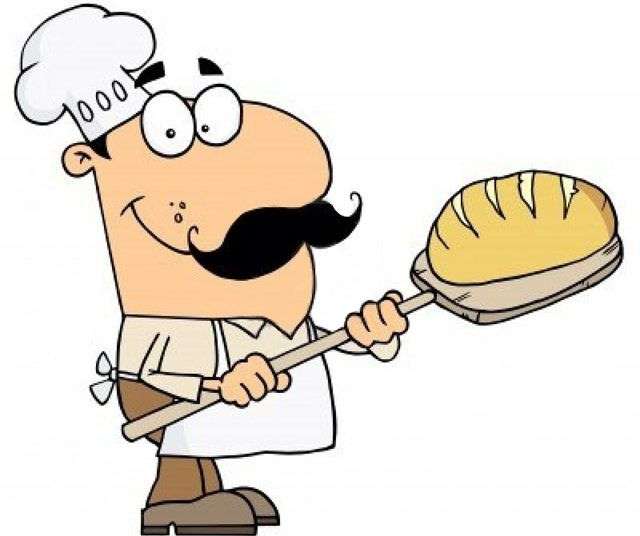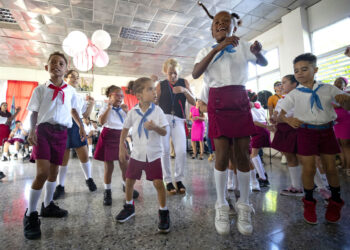In the harsh year of 1994, Jesus Ramon Miller found a purpose for his life. It would seem unlikely because those were the worst year of the 90’s in Cuba; the toughest year of the Special Period; a time of despair and extreme material and spiritual shortages. Yet, Jesus Miller definitely found his course and regardless of all the obstacles he followed it as if possessed by an inexplicable certainty as if it was Ariadna’s mythical thread and it would hold the exit to the Labyrinth on the opposite side.
Truth be told, the challenges from that time were as or more complex than the Labyrinth, as or more fearsome than the Minotaur, as or more definitive that Theseus’ deed. That’s why, Jesus Miller had no other choice but to face time and circumstances and, even though he is unknown, overshadowed by his job, he has not lost his impetus.
Whenever people read Los Ramones in the small tag on the famous butter crackers or the unique garlic sticks, they should also read the story of a man that found the purpose of his life in baking back in 1994.
The long way to one’s objectives
At the age of 17 Miller realized he would not become a university graduate. The need to support himself took him to the sugar mill Ecuador, in the municipality of Baragua, to grease huge gearwheels so that they wouldn’t screech while making sugar, back in the time when this product used to go across the world by ship in exchange for powder milk, canned meat and sardine.
He would find out later that was not the kind of sugar used for making bread because brown sugar was better because it is sweeter and cheaper. Jesus had to come and go from Ciego de Avila to Baragua (public transportation has never been too effective), and he was not born for that.
He had not been born for typesetter assistant, which came after and is necessary to explain what it means given today’s progress. A typesetter was in charge of organizing letter boxes in ancient printer’s called linotypes, from where the Invasor newspaper –the journal of Ciego de Avila province–would come out warm and wet. Back then, the job of an assistant was to melt lead over and over again, and let it cool in the casts, to ink them and try to put in black and white the material and spiritual world of the people. Miller would be immersed in this task till 3:00 am along with journalists, editors, directors, typesetters. It seemed one day was longer than 24 hours because they lost track of time. It also seemed that would be his definite job; however, as it was said before, Jesus Miller’s purpose in life was to make bread, crackers, sticks, queque…
In 1994 self-employment in Cuba was barely outlined; it was a euphemism to avoid referring to it as small business or private initiative; the idea of what would be a different way of managing goods and services; barely shy and distrustful steps towards a different economic scenario in which the State delegates functions and even responsibilities in return for not wearing out in soluble matters in less centralized spheres. At that time, permits were limited, as well as possible staff for that new way of making a living. The most common permits were for those elaborating/selling light foods. Even though Jesus saw a gold mine there, he never got the permit. In fact, he has been sanctioned on charges of performing illegal economic activities, but by that moment he had already undertaken the research of what would make him a master baker.
Ingredients for making bread
Miller cannot accept the low quality of the bread produced today. He assures that with the minimum necessary ingredients it possible to have a decent product. The bread of today lacks love.
As he is an inveterate romantic he calls love the commitment of working within ethical, moral and legal grounds. Without “despairing” oil, yeast, flour, even sugar as if by “magic”. But that’s a different kettle of fish. In some other time we will go back over this issue.
Actually what he enjoys the most is not making bread. He would rather knead crackers dough, stretch it, fold it, feeling any inconsistency with his fingers, caress it as if a pretty woman, not letting it rest, ready to be cut in round or square shapes or in bands for sticks.
His small bakery would never be able to compete with state-owned bakeries. Its modest oven can only take a few trays. Its equipment are not industrial, they are made from pieces and parts from other equipment, as a result of their invention capacity and their need. Even in this scenario he is able to produce 300 packs per day, with barely five workers in charge of the manual process.
He explained he has had to go to the next province of Sancti Spiritus looking for wheat flour, fortunately, now it is sold in some markets and is more or less affordable. With the rest of the ingredients there is no much trouble, “sometimes you can’t find them and have to go somewhere else to get them, but eventually you find them”. He thinks that if the State would provide them with the necessary provisions, he would be able to supply the whole province. Though this may seem too ambitious, I keep thinking on how nice it would be to be able to buy those crackers at a best price and have them more often in everyone’s dining table…
Butter crackers and garlic sticks can be found all over the country already. They spread as quick as or quicker than the flu and moved to the West, as it was to be expected, and to the East, against all migration logics. Prices vary. Jesus sells them for eight Cuban pesos at his home, in the rest of the city they cost 10, but in Jatibonico 15, and in Varadero and Havana 25.
Sticks and crackers lead the market, though queques are easily sold as well. Given the lack of products to represent some competition, these products are respected and are sold everywhere. Consumers mostly value their quality. They affirm they would rather pay 10 Cuban pesos, even though there are less crackers(each pack contains 20 crackers), and enjoy a nice and well-prepared product.
“They are never burned and my boy loves them”, said a mother who frequently buys them for his child snack. “Sticks sold in state-owned shops are not so tasty, these garlic sticks are delightful”, commented an old lady while purchasing two packs. “Perhaps they unbalance my cholesterol, but I can’t help it”, she noted.
Miller claims he is not the only one making crackers and sticks in Ciego de Avila, he shared the recipe with others, these crackers are also found in Villa Clara, but his products are always tagged and always have a unique taste. I advised him to start the proceedings for registering his commercial brand Los Ramones, because there are lots of cunning people out there wanting to make fools of nice and noble people, if we are taking self-employment seriously then we have to play by the market rules and not go blinded as we have done so far.
After 20 years in this business, Jesus Miller is certain he will grow old in this job because he says the smell of recently baked crackers is the purpose of his life.
Notes:
In Ciego de Avila province there are two factories devoted to the production of crackers: one in Moron, with a production capacity of 5775 one kilogram packs in one shift; and the other one in Ciego de Avila, in charge of producing 1500 packs daily for tourism and sales in Cuban convertible pesos.
The monthly plan of the province is of 108 000 packs. On Sunday mornings they sell about 3000 packs.
Crackers sold in Cuban convertible pesos have a different formula and the ingredients are also purchased in Cuban convertible pesos.
In contrast with butter crackers, those produced by the State are no match.
Secrets:
To achieve a taste of garlic in the sticks, Miller adds some oil and garlic and pours it over baked sticks.
All the members of his family know the secrets of bread and crackers.
The reason for naming his products Los Ramones is because at the beginning they were two: Miller and a friend also by the name of Ramon










